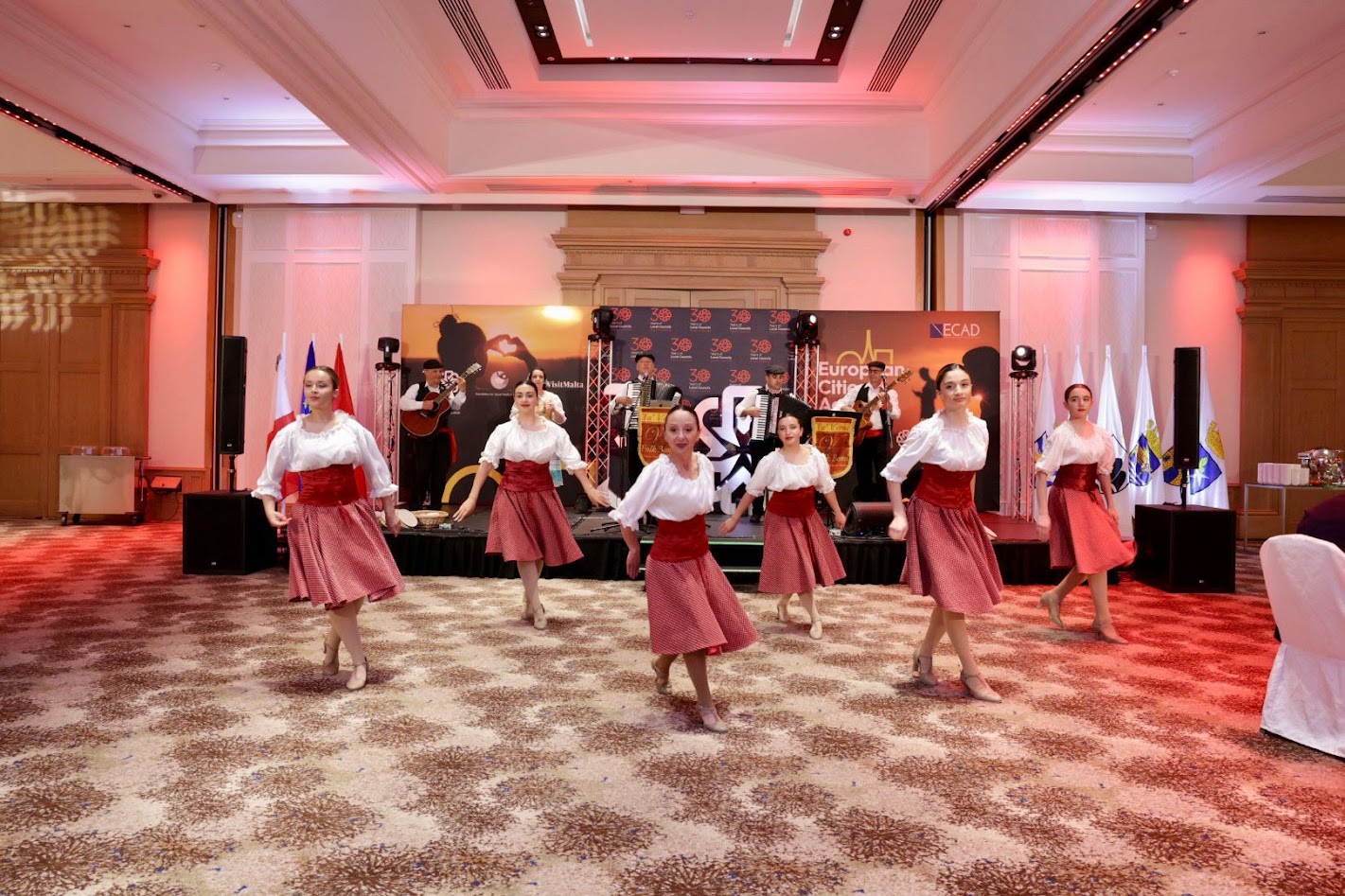- Details
- Category: News
- Published: 17 May 2023
28th ECAD's Mayors' Conference - Day 1

On May 11th, ECAD’s 28th Mayors Conference, hosted by the Local Councils’ Association Malta, took place in Qwara, Malta at the Dolmen Hotel. The Conference was attended by 75 participants. The majority of participants were local counsellors, non-governmental organisations, or representatives from the local authority from Malta. 7 more countries were represented at the conference, including Sweden, the United Kingdom, Ireland, Greece, Slovenia, etc


On May 11th, ECAD’s 28th Mayors Conference, hosted by the Local Councils’ Association Malta, took place in Qwara, Malta at the Dolmen Hotel. The Conference was attended by 75 participants. The majority of participants were local counsellors, non-governmental organisations, or representatives from the local authority from Malta. 7 more countries were represented at the conference, including Sweden, the United Kingdom, Ireland, Greece, Slovenia, etc

The conference was opened by Mario Fava, president of the Local Councils’ Association Malta, Viggo Lütcherath, and the Parliamentary Secretary for the Local Government. The latter highlighted the well-being of communities as one of the key priorities of the local governments and that the issue of drug abuse must be addressed comprehensively.
After the opening, several speakers were given the floor to speak. First, the prevention team within Sedqa presented two studies that they had conducted in Malta. The first study studied the role of a workplace policy in addressing employees’ substance misuse difficulties. The second study focused on substance misuse policy in the workplace: senior leadership teams’ attitudes. The first study concluded that employees do value support from their management. With support, they would be more likely to seek help when facing a substance use disorder. Additionally, substance use policies would encourage employees to seek help and, hence, be of great benefit. Training and support are valued and seen as a form of investment. The second study recommended that, in the field of policy, various collaborative drafts of workplace-related policies targeting mental health will be done; more budgetary funds for human resources by government and ministries should be allocated to enable increased inter-agencies collaboration; the integration of the introduction of community outreach work targeting coping skills and decision-making skills by the Ministry of Social Solidarity and National drug policy action plan. Regarding practice, the study recommended collaboration with various stakeholders to ensure employment re-integration of individuals who have substance use difficulties; the implementation of the S.A.F.E. programme in workplaces, endorsed by stakeholders; online marketing initiatives addressing the need to foster a healthy balanced lifestyle with adaptive coping skills.

The second presentation was given by Jon Sigfússon from Planet Youth. He presented the background of the Planet Youth Model, which is a prevention method designed to have a long-term impact. It focuses on building an environment that delays the onset of substance use and is implemented around the world. The programme is built on data and uses the collected knowledge to understand the situation in the community, act, and decrease the impact. The total length of the programme is 5 years and is divided into various steps. Planet Youth focuses on long-term change and realises that change does not happen overnight. Hence, the importance of full collaboration over 5 years and constant guidance.

The second presentation was given by Jon Sigfússon from Planet Youth. He presented the background of the Planet Youth Model, which is a prevention method designed to have a long-term impact. It focuses on building an environment that delays the onset of substance use and is implemented around the world. The programme is built on data and uses the collected knowledge to understand the situation in the community, act, and decrease the impact. The total length of the programme is 5 years and is divided into various steps. Planet Youth focuses on long-term change and realises that change does not happen overnight. Hence, the importance of full collaboration over 5 years and constant guidance.
The third presentation was held by Matej Košir from UTRIP. He presented a case study from Slovenia promoting the implementation of prevention in an environment in which cannabis legalisation is apparent. He shared various steps taken by organisations in Slovenia. The first step was to educate mainstream media on the background of the pro-legalisation lobby, including their economic interest, and involved them in family- and prevention-related discussions. Secondly, they focused on re-establishing the perception of risk, as this is decreasing, and changing wordings, such as framing cannabis use as psychoactive use instead of recreational use. Or to not confuse medical cannabis with psychoactive cannabis use. Third, they summarised the evidence and the problems that were seen, comparing alcohol and tobacco with cannabis. Finally, he stressed the importance of a strong advocacy coalition at the national level and use the negative experience and data from countries in which cannabis has been legalised.
The fourth presentation was given by Dr Mario Lintz. He shared the impact of marijuana legalisation in Colorado. The presentation showcased the timeline of marijuana legalisation in Colorado. From the steps that were made to get medical marijuana to legalisation. Simultaneously, he showcased how the policy changes impacted cannabis use among youth and intoxicated driving, which both have seen an increase since cannabis got legalised. He shared that it is important to slow down initiation as those starting to use substances at a younger age, 1 in 6 are likely to develop an addiction. Whereas if they start after 18 years of age, the number is 1 in 11.

The fifth presentation was provided by Mulka Nisic. She highlighted the concept of Recovery and the importance of Recovery cities. Recovery is a long-term journey which is often highly stigmatised. Not only by the community but also by professionals and policymakers. Stigma causes barriers to embark on the journey of recovery. Relapse is a common occurrence in the journey of recovery and the process of recovery can take many years. However, after 5 years in remission, the relapse rate is 40%. Within recovery, creating an environment of CHIME (connection, hope, identity, meaning, and empowerment) is essential. Additionally, the recovery capital, including personal, social, and collective capital is needed to support the recovery and rehabilitation pathway. Mulka shared the concept of recovery cities, which are cities supporting recovery-oriented systems of care, including CHIME, and where citizens can build connections. The city also puts in efforts to make recovery visible and decrease the stigma surrounding recovery. Every city would need different focus areas and services and, hence, needs assessment, tailored action plan, an overview of existing resources, evaluations, etc. need to be put in place. To become an inclusive recovery city, various stakeholders, communities, professionals, etc. will need to be included.

The ECAD Board and team (from left to right - Viggo Lütcherath ([former] Chair of ECAD), Mario Fava (President of the Local Councils' Association Malta), Elisabeth Thulin (Ystad), Göran Gredfors ([newly-elected] ECAD Chair) Erik Ake Sertreus (ECAD), and Cressida de Witte (WFAD)
The evening programme included a dinner gala in which the participants were able to further network and discuss the observations of the day while enjoying a cultural experience with Maltese songs and dances.


28th ECAD's Mayors' Conference - Day 2
The second day of the Conference included a study visit to Komunita Santa Marija. Santa Marija is an in-house rehabilitation centre. The presentation given at the centre elaborated on the programmes provided and the phases that residents go through. The following points were shared in the presentation
- The residents are referred by another organisation in Malta.
- The Programme is focused on the individual and each person is individually assessed.
- The programme is divided into three phases: Assessment and stabilisation phase; Therapeutic phase; and Reintegration phase.
- It is a gender-mixed centre, however, the programmes for each individual are based on their personal needs assessment.
- There is a fixed routine for residents, including vocational training.
- If the resident is a parent, they are able to stay in touch with their children via phone calls.
- The residents can leave the programme anytime
- The programme is free
- 10% of the residents are foreign
- etc.



After the interesting study visit, the Maltese organisers organised a cultural visit for the international participants. The cultural visit showcased the beautiful historical and natural sights of Malta.

- 10% of the residents are foreign
- etc.



After the interesting study visit, the Maltese organisers organised a cultural visit for the international participants. The cultural visit showcased the beautiful historical and natural sights of Malta.


